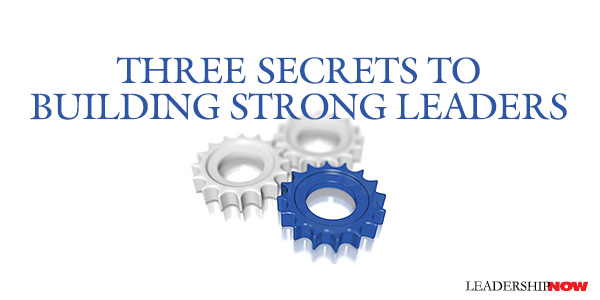 |
 |
07.02.21

Three Secrets to Building Strong Leaders
TOO many leaders are stuck in mediocrity. A Ketchum study found that only 23% of the 25,000 surveyed believe their leaders are leading well. Only 31% believe leaders communicate well. Only 17% have confidence that leadership will improve in the upcoming year. And after the 2020-21 Covid response, I doubt those statistics have changed much. Alain Hunkins, author of Cracking the Leadership Code, says “there is a path out of the muddle of mediocrity. Great leaders aren’t born—they’re made. If you are committed, you can learn and apply specific tools to improve how you lead.” Great leaders share these three fundamental qualities: connection, communication, and collaboration.
Connection The foundation of connection is empathy. Connection builds trust, insight, engagement, and results. So why don’t we see more of it? One reason is we simply don’t practice it. “It needs to be exercised regularly to get stronger. If you don’t use it, it atrophies.” Another reason is a rigid, right-wrong mindset. A right-wrong mindset can lead to controlling behavior. Needing to be right, disconnect you from others. “Clinging to a need to be right closes you off to the perspective and experience of others. You don’t listen—you fake listen.” A third reason is we fear empathy will open up an emotional can-of-worms. Not to mention the fear that expressing vulnerability will be taken advantage of. Fourth, we are too impatient to take the time to be empathetic. It’s true. Empathy takes time. “Leader with a bias for action may be operating with the unconscious belief that they don’t have time to offer empathy. But this belief has an unintended impact: Making those around them feel less valued and understood. When people feel devalued, their motivation plummets. These lead to declines in performance. Ultimately, results suffer.” There is also what is called the hot-cold empathy gap. That is, how our emotional state affects our ability to relate to someone else in an opposite emotional state. If I’m calm, it is difficult to relate to someone experiencing anger. And finally, the higher we go in an organization, the disconnected we become from those under us. Leading isn’t an abstract idea that exists between you and somebody else or a group of people. It’s a connection that’s built through a genuine relationship. Communication We would all agree that communication is critical to what we do, and we assume it is happening. We take it for granted. And we shouldn’t. There are three major obstacles to communication. The typical problem is that we are not on the same page. What I say is not what you hear. I know what I mean but do you. It’s called projection bias when we assume others know what we are thinking. Better to assume that what we mean is not what they understand and clarify. Those you are communicating with need context. You know why what you are saying is important and what needs to be done about it. When communicating, others need to know the background of your thinking. They need to know why you are saying what you are saying so they can act appropriately. Another common issue is overload. We are overwhelmed with information. “People have plenty of other messages competing for their precious brain cells. They’re not going to focus on you just because you want them to. People don’t want more information—they want insight.” Hunkins says to improve your communication you need to communicate with the end in mind, have a central message, create checks for understanding, own and fix communication breakdowns, make the implicit explicit, and master the medium—raise your communication game.” Collaboration To lead, you need the abilities and experience of everyone in the room. Collaboration takes your effectiveness to a whole new level. It is an increasingly important skill to have in our digital age. “Although you can’t motivate anyone else, you can design the conditions in which they motivate themselves. You can use your understanding of human needs and the employee experience to lead a team of joyful, engaged, and high-performing people.” Hunkins covers these topics well and also the need to simplify so that you don’t get in your team’s way. All three of these qualities are more challenging for the leader in this digital age. Organizations are increasingly made up of people who do not share common cultural backgrounds. These differences manifest themselves in the way people communicate and think. It becomes a challenge when building trust and collaboration. 
Posted by Michael McKinney at 10:05 AM
|
BUILD YOUR KNOWLEDGE
 

How to Do Your Start-Up Right STRAIGHT TALK FOR START-UPS 
Grow Your Leadership Skills NEW AND UPCOMING LEADERSHIP BOOKS 
Leadership Minute BITE-SIZE CONCEPTS YOU CAN CHEW ON 
Classic Leadership Books BOOKS TO READ BEFORE YOU LEAD |